|
Welcome
| |
Spring is here, a time for renewal and rebirth, a time for a fresh start and new ideas, and a renewed sense of spirit and hope. This is reflected by the tone of a new government in its relationship with Indigenous peoples as they launch a national public inquiry into missing and murdered Indigenous women and girls in Canada; work to address inequities in the social determinants of Indigenous peoples' health; and foster reconciliation by implementing the 94 recommendations of Truth and Reconciliation Commission. This newsletter highlights our most recent activities and provides links to newly released resources.
We have been busy with a number of events and the development of several projects since our last update in December. The NCCAH hosted three webinars in as many months: "Métis history, identity and the Métis Nation today", "Cultural safety for Indigenous peoples: A determinant of health", and "Re-thinking Family Violence: Centering Indigenous Knowledges". Please see the "New NCCAH Resources" section of this newsletter for additional webinar details.
The National Collaborating Centres for Public Health (NCCPH) held a two-day staff-training event in Vancouver from February 2-3, 2016. Members of our staff and the staff from our sister NCCs (Infectious Diseases, Determinants of Health, Environmental Health, Healthy Public Policy, and Methods and Tools) came together for shared learning and to exchange knowledge about ways to improve knowledge translation. This included discussions on the use of technology that may lead to improved KT delivery and the sharing of experiences related to on-line communities of practice, as well as cultural competency with respect to knowledge translation relevant to Indigenous peoples in Canada. The training event provided a wonderful opportunity to reconnect with colleagues and meet with new ones from the other NCCs and to discuss collaborative projects.
The NCCAH participated in a number of events since December that allowed us to connect with, network and exchange knowledge with members of key organizations actively involved in improving the health of Indigenous peoples. The Aboriginal Nurses Association of Canada (ANAC) held their National Training Forum in Montreal on February 15-17, 2016. The "Authentic Indigenous Health and Wellness Partnerships: Reclaimative Leading Practices" forum provided an opportunity to share knowledge on the contributions Aboriginal nurses have made in the field of nursing education, practice, policy and research for First Nations, Inuit and Métis populations in Canada, and ways of improving health outcomes. Roberta Stout, NCCAH Research Associate, along with Margaret Haworth-Brockman of the NCCID and Susan Snelling of the NCCMT presented in the HIV Learning Institute workshop to assess the quality and accuracy of online health information.
The Chronic Disease Prevention Alliance of Canada (CDPAC) held its 6th Pan-Canadian Conference on February 22-23, 2016 in Toronto. The conference focused on the health, economic, and social value created through integrated chronic disease prevention. Margo Greenwood, NCCAH Academic Lead, presented at a plenary on "Investing in wellness for First Nations, Inuit and Métis people" and highlighted some of the enhancements and partnerships needed to transform the health care delivery system for Aboriginal communities.
Be sure to visit our website or subscribe to our mailing list to receive notifications of newly released NCCAH resources, upcoming webinars and our regular quarterly newsletters. Please enjoy and share our knowledge resources with your community and networks and join us on Twitter, Facebook, Google+, LinkedIn, Vimeo, and now YouTube or SoundCloud to participate in updates as they happen!
Meegwetch
Margo Greenwood, Academic Leader
National Collaborating Centre for Aboriginal Health (NCCAH)
|
|
|
Attended Events
|
Upcoming Events
| |
North West Health Equity Forum
Prince George, British Columbia, February 11-12, 2016. Conference Blog
Aboriginal Nurses Association of Canada (ANAC) 2016 National Training Forum Montreal, Quebec, February 15-17, 2016. Conference web site link
Chronic Disease Prevention Alliance of Canada (CDPAC) Sixth Pan-Canadian Conference Toronto, Ontario, February 23-25, 2016. Conference web site link
Global Summit on Childhood San José, Costa Rica, March 31 - April 3, 2016. Conference web site link
The Ontario Public Health Convention (TOPHC) Toronto, Ontario, April 4-6, 2016. Conference web site link
Please visit the online NCCAH calendar of events, which highlights conferences, workshops, and other events of interest in the field of Aboriginal Health including regional, national and global listings. |
22ND The International Union for Health Promotion and Education (IUHPE) World Conference on Health Promotion
Curitiba, State of Paraná, Brazil, May 22-26, 2016. Conference web site link
Indigenous Health Conference (IHC) 2016: Towards Health and Reconciliation Toronto, Ontario, May 26-27, 2016. Conference web site link
11th National Community Health Nurses of Canada (CHNC) Conference St. John's, Newfoundland, May 30 - June 1, 2016. Conference web site link
Canadian Public Health Association (CPHA) Public Health 2016 Toronto, Ontario, June 13-16, 2016. Conference web site link
Send us an email to nccah@unbc.ca with "Calendar Submission" in the subject line if you have an event you would like added to our calendar. |
|
|
New NCCAH Resources
| |
We are excited to share our new DVD from the "Family is the Focus" gathering that took place on the traditional territories of the Tsleil-Waututh, Squamish and Musqueam Peoples in Vancouver, British Columbia from February 18-20, 2014. Speakers from New Zealand and the United States joined gathering participants from across Canada during this three-day event. The gathering was the fourth in our series bringing together community members, practitioners, policy makers and members of Indigenous families to share information, knowledge and experience on the roles and responsibilities of family in the health and well-being of Indigenous communities. The DVD showcases footage from the keynote and panel discussions, as well as messages brought forth by participants. The proceedings report includes the pull-out poster Commitment to Family which is equipped with a zapcode to view digital images of the participant drawings. Visit the Apple App Store or Google Play to download the Zappar App or learn more at www.zappar.com.
(Read the full web story | Watch the video | Request copies)

Use Zappar (code above) to view the participant drawings. Click a link below to request a poster file to print with a vendor of your choice:
11x17 Small Clean edge | With Crops
18x24 Medium Clean edge | With Crops
24x36 Large Clean edge | With Crops
|
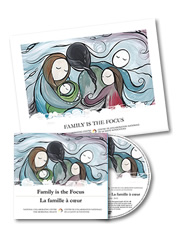
Family is the Focus
proceedings report
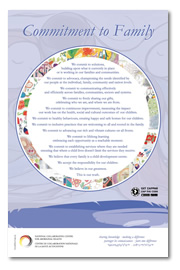
Commitment to Family
poster
|
| |
On January 27, 2016, Métis historian Dr. Brenda MacDougall and Brodie Douglas, a representative from Métis Nation BC, presented a webinar entitled "Knowing who you are: Métis history, identity and the Métis Nation today". This webinar explored the historical and contemporary identity and influence of Métis people in Canada. Dr. MacDougall overviewed the historical context in which the Métis Nation was born and highlighted the importance of knowing one's identity and history to a strong and healthy nation, while Mr. Douglas provided thoughts on the contemporary challenges and advances of Métis people in Canada. The webinar was attended by 163 participants.
(Webinar Resources | View archived announcement)
  Dr. Macdougall Dr. Macdougall
  Mr. Douglas Mr. Douglas
 
|
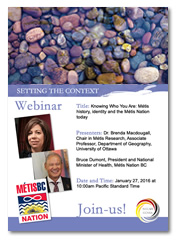
Knowing who you are:
Métis history, identity and
the Métis Nation today
|
| |
A second webinar, co-hosted with Northern Health, was held on February 17, 2016 on "Cultural safety for Indigenous peoples: A determinant of health." Dr. Sarah de Leeuw, Associate Professor in the Northern Medical Program, University of Northern British Columbia and a Research Associate for the National Collaborating Centre for Aboriginal Health, explored how racism has manifested in the way health care services are provided to Indigenous peoples and is thus a barrier to their optimal health. Specifically, the presentation highlighted the ways in which Indigenous people have expressed their realities of experiencing racism, and discussed ways that healthcare professionals might engage with the arts and humanities in order to more deeply reflect on their thoughts about racism and Indigenous peoples. The webinar attracted great interest, with 366 participants in attendance.
(Webinar Resources | View archived announcement)
   
|
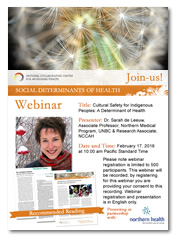
Cultural safety for Indigenous peoples: A determinant of health.
|
|
|
Online Multimedia
| |
This section features infographics, interactives, apps or videos that we found interesting or educational. Please note the links provided in the NCCAH newsletters are for general interest only and do not indicate an endorsement. The views expressed in the linked resources do not necessarily represent the views of the NCCAH or our funder the Public Health Agency of Canada.
Send us an email if you have multimedia resources you would like included in our next newsletter to nccah@unbc.ca with "Multimedia Submission" in the subject line.
| |
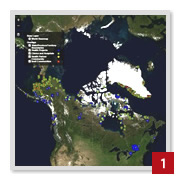
|
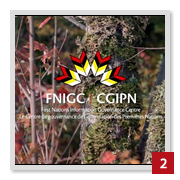
|
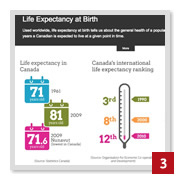
| |

|
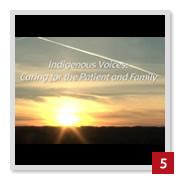
|
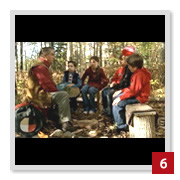
| |
1) The Inuit Mental Health And Wellness Map offers an inventory of programs and studies that focus on Inuit mental health and wellness across the circumpolar region. It is based on programs and studies identified by the Inuit Circumpolar Council Canada (ICC-Canada) in its Circumpolar Inuit Health Priorities: Best Health Practices and Research report (2012), as well as new mental health and wellness programs identified in 2014.
2) The latest video from the First Nations Information Governance Centre (FNIGC) explores the organization's innovative approach to First Nations data-gathering, and looks at how this data supports programs and planning for First Nations people and the communities they live in.
3) Used worldwide, life expectancy at birth tells us about the general health of a population. It shows the average number of years a Canadian is expected to live at a given point in time. This CIHI infographic shows that Nunavut has the lowest life expectancy in Canada at 71.6 years.
4) CBC's Peter Manbridge sits down with Cindy Blackstock to talk about her work advocating for the equal treatment and funding for aboriginal and First Nations children.
5) In this video, "Indigenous Voices: Caring for the Patient and Family", individuals from First Nations, Inuit and Métis communities across Canada speak about palliative care and end of life.
6) Watch four Mi'kmaq legends: "Mi'kmaq or (L'nu, "the people" in Mi'kmaq) are Aboriginal peoples who are among the original inhabitants of the Atlantic provinces of Canada. Today, Mi'kmaq communities are located mainly in Nova Scotia and New Brunswick, but with a significant presence in Quebec (Restigouche/Listuguj), P.E.I., Newfoundland, Maine and the Boston area. Get a taste of this people's fascinating ancestral mythology with these four short films that bring, through ingenious animation and theatre, their legends to life." The National Film Board of Canada's Blog
|
|
|
The NCCs of NCCPH
| |
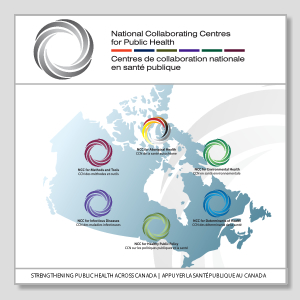
|
The NCCs of NCCPH work together to promote and improve the use of scientific research and other knowledge to strengthen public health practices and policies in Canada. We identify knowledge gaps, foster networks and translate existing knowledge to produce and exchange relevant, accessible, and evidence-informed products with practitioners, policy makers and researchers.
Read the latest NCC e-bulletin
| |
Collaborative Event with NCCDH
| |
The North West Health Equity Forum: Working Together for Child Health gathered over sixty inter-sectoral partners in Prince George, BC, on February 11 and 12th, 2016. The intention of the forum was to strengthen partnerships and collaborative action to improve health equity across rural communities in the Canadian northwest. As part of this dialogue, Dr. Margo Greenwood and Dr. Sandra Allison (Chief Medical Health Officer, Northern Health) presented in the panel, Aligning a Collective Vision for Child Health: reflections on Indigenous health equity and the new Northern Health Child Health Report.
Read more about this event on the NCCDH blog.
|
|
|